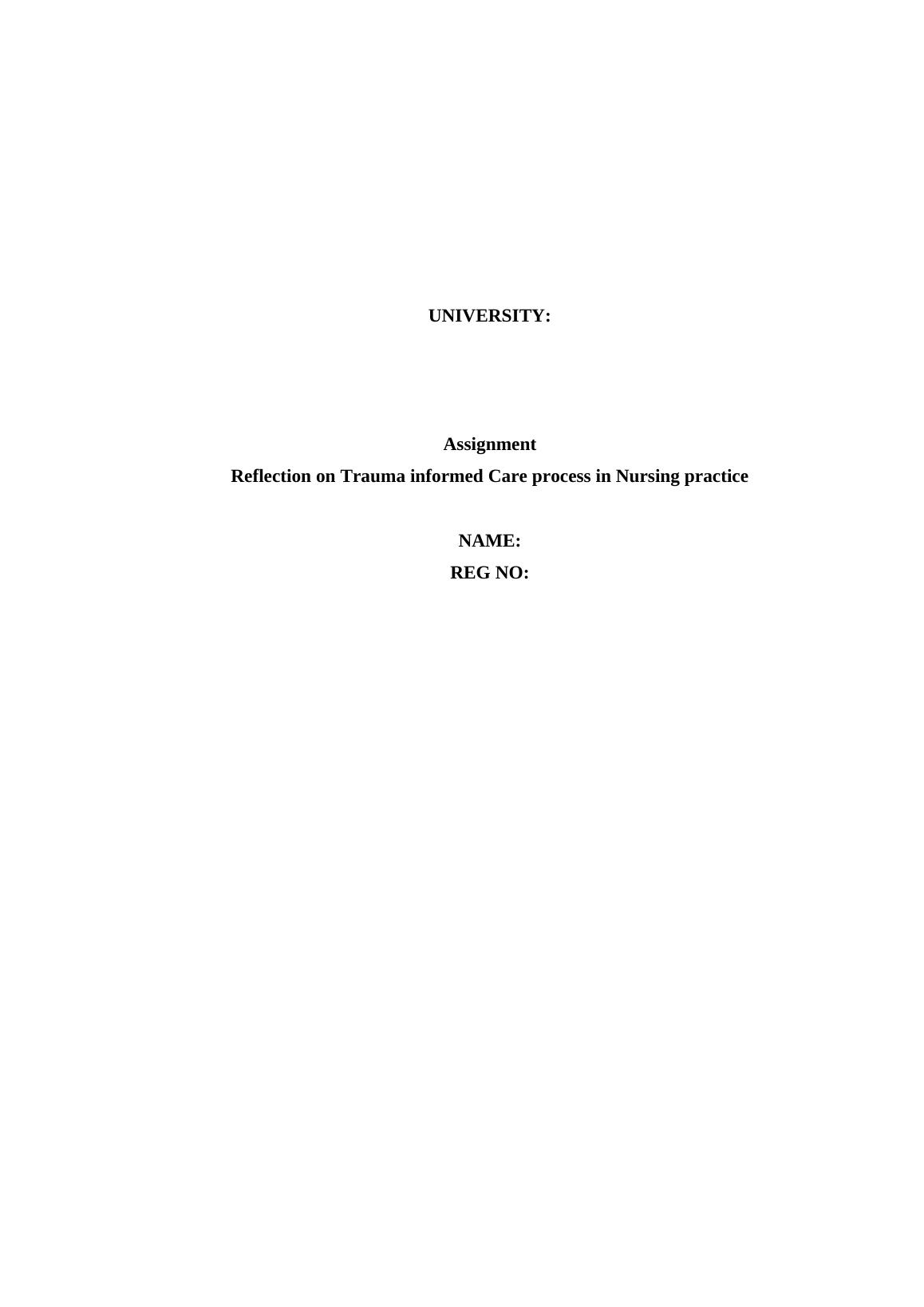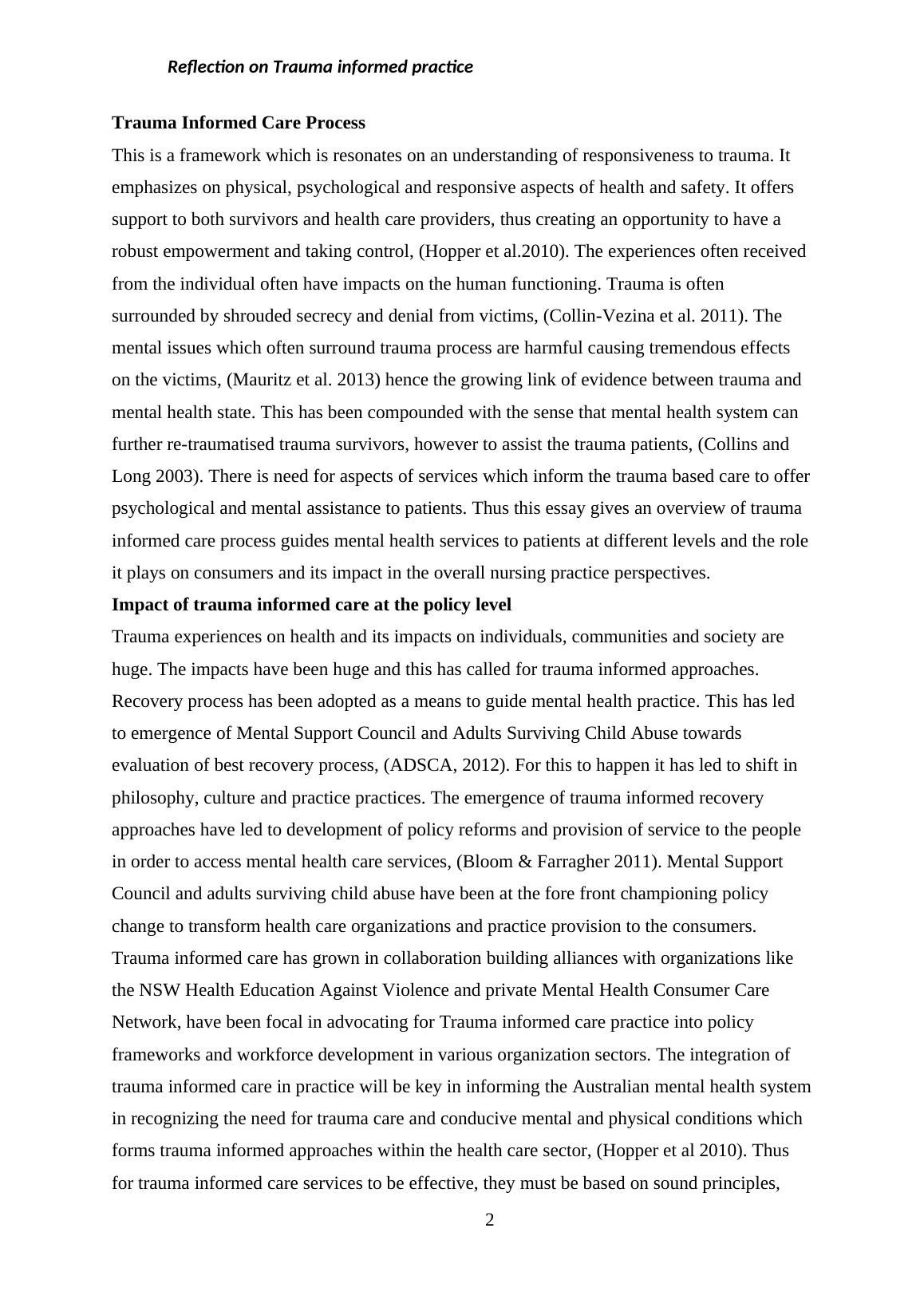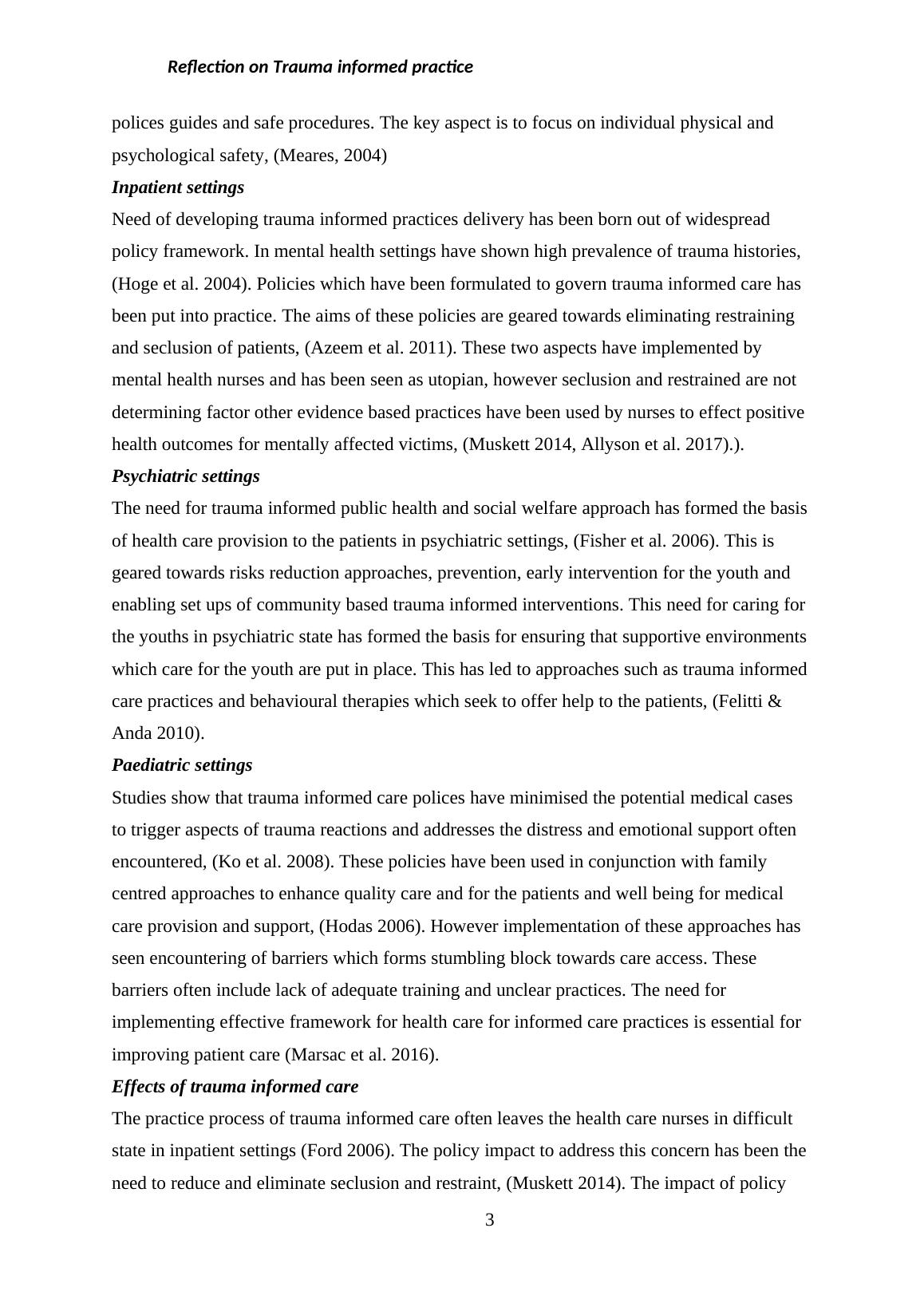Essay on Trauma Informed Care Process in Nursing Practice
8 Pages2930 Words497 Views
Added on 2020-04-01
Essay on Trauma Informed Care Process in Nursing Practice
Added on 2020-04-01
ShareRelated Documents
UNIVERSITY:AssignmentReflection on Trauma informed Care process in Nursing practiceNAME:REG NO:

Reflection on Trauma informed practiceTrauma Informed Care Process This is a framework which is resonates on an understanding of responsiveness to trauma. It emphasizes on physical, psychological and responsive aspects of health and safety. It offers support to both survivors and health care providers, thus creating an opportunity to have a robust empowerment and taking control, (Hopper et al.2010). The experiences often received from the individual often have impacts on the human functioning. Trauma is often surrounded by shrouded secrecy and denial from victims, (Collin-Vezina et al. 2011). The mental issues which often surround trauma process are harmful causing tremendous effects on the victims, (Mauritz et al. 2013) hence the growing link of evidence between trauma and mental health state. This has been compounded with the sense that mental health system can further re-traumatised trauma survivors, however to assist the trauma patients, (Collins and Long 2003). There is need for aspects of services which inform the trauma based care to offerpsychological and mental assistance to patients. Thus this essay gives an overview of trauma informed care process guides mental health services to patients at different levels and the roleit plays on consumers and its impact in the overall nursing practice perspectives.Impact of trauma informed care at the policy level Trauma experiences on health and its impacts on individuals, communities and society are huge. The impacts have been huge and this has called for trauma informed approaches. Recovery process has been adopted as a means to guide mental health practice. This has led to emergence of Mental Support Council and Adults Surviving Child Abuse towards evaluation of best recovery process, (ADSCA, 2012). For this to happen it has led to shift in philosophy, culture and practice practices. The emergence of trauma informed recovery approaches have led to development of policy reforms and provision of service to the people in order to access mental health care services, (Bloom & Farragher 2011). Mental Support Council and adults surviving child abuse have been at the fore front championing policy change to transform health care organizations and practice provision to the consumers.Trauma informed care has grown in collaboration building alliances with organizations like the NSW Health Education Against Violence and private Mental Health Consumer Care Network, have been focal in advocating for Trauma informed care practice into policy frameworks and workforce development in various organization sectors. The integration of trauma informed care in practice will be key in informing the Australian mental health systemin recognizing the need for trauma care and conducive mental and physical conditions which forms trauma informed approaches within the health care sector, (Hopper et al 2010). Thus for trauma informed care services to be effective, they must be based on sound principles, 2

Reflection on Trauma informed practicepolices guides and safe procedures. The key aspect is to focus on individual physical and psychological safety, (Meares, 2004)Inpatient settings Need of developing trauma informed practices delivery has been born out of widespread policy framework. In mental health settings have shown high prevalence of trauma histories, (Hoge et al. 2004). Policies which have been formulated to govern trauma informed care has been put into practice. The aims of these policies are geared towards eliminating restraining and seclusion of patients, (Azeem et al. 2011). These two aspects have implemented by mental health nurses and has been seen as utopian, however seclusion and restrained are not determining factor other evidence based practices have been used by nurses to effect positive health outcomes for mentally affected victims, (Muskett 2014, Allyson et al. 2017).). Psychiatric settingsThe need for trauma informed public health and social welfare approach has formed the basisof health care provision to the patients in psychiatric settings, (Fisher et al. 2006). This is geared towards risks reduction approaches, prevention, early intervention for the youth and enabling set ups of community based trauma informed interventions. This need for caring for the youths in psychiatric state has formed the basis for ensuring that supportive environments which care for the youth are put in place. This has led to approaches such as trauma informedcare practices and behavioural therapies which seek to offer help to the patients, (Felitti & Anda 2010). Paediatric settings Studies show that trauma informed care polices have minimised the potential medical cases to trigger aspects of trauma reactions and addresses the distress and emotional support often encountered, (Ko et al. 2008). These policies have been used in conjunction with family centred approaches to enhance quality care and for the patients and well being for medical care provision and support, (Hodas 2006). However implementation of these approaches has seen encountering of barriers which forms stumbling block towards care access. These barriers often include lack of adequate training and unclear practices. The need for implementing effective framework for health care for informed care practices is essential for improving patient care (Marsac et al. 2016).Effects of trauma informed careThe practice process of trauma informed care often leaves the health care nurses in difficult state in inpatient settings (Ford 2006). The policy impact to address this concern has been the need to reduce and eliminate seclusion and restraint, (Muskett 2014). The impact of policy 3

End of preview
Want to access all the pages? Upload your documents or become a member.
Related Documents
Trauma-Informed Care In Mental Health Reportlg...
|9
|2188
|247
Foundations of research inquiry Assignmentlg...
|10
|2445
|22
Role of Human Services in Preventing and Responding to Child Abuse and Neglectlg...
|14
|1201
|123
The Effect of Childhood Traumalg...
|5
|1206
|20
Trauma-Informed Care for Addiction Patients: Understanding Trauma and Relapse Prevention Therapylg...
|7
|1585
|474
Importance of Understanding Trauma | Essaylg...
|4
|641
|19
